|
|
|
Sort Order |
|
|
|
Items / Page
|
|
|
|
|
|
|
| Srl | Item |
| 1 |
ID:
163142
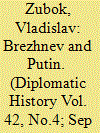

|
|
|
|
|
| Summary/Abstract |
Vladimir Putin's announcement to run for another term makes him the most durable leader in Russia's recent history. Some think of Putin as "the new Brezhnev," who might die in office many years from now. But is it fair to compare Putin to Leonid Brezhnev? Can the Soviet past provide any lesson's for Russia's present and future? What should the United States expect for Putin?
|
|
|
|
|
|
|
|
|
|
|
|
|
|
|
|
| 2 |
ID:
050239
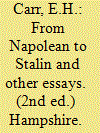

|
|
|
|
|
| Edition |
2nd ed.
|
| Publication |
Hampshire, Palgrave Macmillan, 2003.
|
| Description |
xxi, 277p.Pbk
|
| Standard Number |
0333994019
|
|
|
|
|
|
|
|
|
|
|
|
Copies: C:1/I:0,R:0,Q:0
Circulation
| Accession# | Call# | Current Location | Status | Policy | Location |
| 047558 | 940/CAR 047558 | Main | On Shelf | General | |
|
|
|
|
| 3 |
ID:
128456
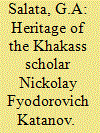

|
|
|
|
|
| Publication |
2013.
|
| Summary/Abstract |
Over 150 years have passed since the birth of one of the most talented, productive and brightest researchers of two past centuries. It has become usual that when they talk about the study of Siberia, particularly of Khakassia, first of all they begin to talk about a meaning - path-breaking. Researches in the sphere of humanities are not an exception. In a famed cohort of Russian pioneering orientalists, one of the first places belongs to outstanding Russian scholar-Turcologist, pedagogue Nickolay Fyodorovich Katanov.
|
|
|
|
|
|
|
|
|
|
|
|
|
|
|
|
| 4 |
ID:
025833


|
|
|
|
|
| Publication |
London, University of London Press Ltd, 1968.
|
| Description |
416p.Hbk
|
| Standard Number |
340069406
|
|
|
|
|
|
|
|
|
|
|
|
Copies: C:1/I:0,R:0,Q:0
Circulation
| Accession# | Call# | Current Location | Status | Policy | Location |
| 007957 | 911.47/PAR 007957 | Main | On Shelf | General | |
|
|
|
|
| 5 |
ID:
129545
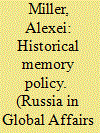

|
|
|
|
|
| Publication |
2014.
|
| Summary/Abstract |
History of Russia narrated as a sequence of only horrors and failures or, on the contrary, as a continuous string of victories and successes is equally unproductive for forming the individual and collective identity.
Active patriotism is a key element of a nation's human capital. Fostering active patriotism requires a consistent policy of memory, including an integral concept of Russia's past that would meet the strategic task of developing society and the state. The past twenty years have seen inefficient and inconsistent efforts to pursue such a policy. The result has been a semi-Soviet individual with almost no links with or emotional feelings for the history of his country and with no knowledge of it. World War II remains the only basic element of the memory policy; however, its emotional impact cannot but decrease with years. An active, consistent and competent policy of memory is needed. Attempts to do without ideology and without a policy of memory have led to disastrous results as regards the moral state of society. Like the state, society has lost its development vector. Instead of creative diversity, there is a destructive chaos in people's minds.
|
|
|
|
|
|
|
|
|
|
|
|
|
|
|
|
| 6 |
ID:
133761
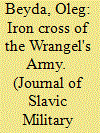

|
|
|
|
|
| Publication |
2014.
|
| Summary/Abstract |
This article is based on little-known sources and unpublished documents and traces the fates of some White Army veterans, who during WWII served in the German Army, holding a rank of sonderführer. Some of them were evacuated to Gallipoli from Crimea in November 1920 (gallipoliytsy). The topic of Nazi administration attitude toward the use of Russian emigrants on the front is also touched upon. Special attention is given to the biographies of Russian emigrant interpreters in the 9th Army of the Wehrmacht. It is concluded that the final aims and motivation of Nazis and White émigrés were different. Realization of that contradiction helps the researcher to understand why a part of Russian military emigration had chosen collaboration and joined Hitler's 'crusade against Bolshevism'.
|
|
|
|
|
|
|
|
|
|
|
|
|
|
|
|
| 7 |
ID:
128471
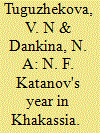

|
|
|
|
|
| Publication |
2013.
|
| Summary/Abstract |
This article is devoted to the description and analysis of scientific events held in Khakassia in connection with the celebration of 150"' birth anniversary of the Khakass scholar, Turkologist, orientalist, Doctor of comparative philology Nickolay Fyodorovich Katanov: an international scientific conference, popularizing the scholar's heritage, collecting and publishing his works. According to the Government decree of the Republic of Khakassia, the year 2012 was declared as Khakass scholar Nickolay Fyodorovich Katanov's Year in Khakassia. In thirteen countries more, which are members of international organization of Turkic culture, the year 2012 was declared as outstanding orientalist, Turkologist N. F. Katanov's Year.
|
|
|
|
|
|
|
|
|
|
|
|
|
|
|
|
| 8 |
ID:
128484
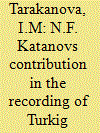

|
|
|
|
|
| Publication |
2013.
|
| Summary/Abstract |
Today the recording of languages is considered to be comparatively a new branch of linguistics, which is connected with field linguistics, i.e. with the study of languages in their natural habitation sphere. N. F.
Katanov may be rightfully named as a field scholar, who professionally approached the recording of languages. The main goal of recording is gathering and accumulation of primary data about poorly explored languages. It is especially now because their number is declining. As A. V. Arhipov notes, activity of a field linguist is aimed at description of 11 language, at direct study of the language phenomena, while various concrete research problems can be resolved. The goal of recording is to gather basic data, which would help to investigate a language hereafter (i.e. to resolve concrete research problems) even if it is impossible to get new data. Texts of different speech genres are fixed (stories, fairy-tales, legends, cases from life, etc.). N. F. Katanov may, therefore, be rightfully named as a true field linguist.
|
|
|
|
|
|
|
|
|
|
|
|
|
|
|
|
| 9 |
ID:
128470
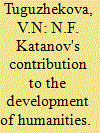

|
|
|
|
|
| Publication |
2013.
|
| Summary/Abstract |
Professor N. F. Katanov has been one of the famous and outstanding national scholars and thinkers of Russian science, education and culture at .the turn of nineteenth and early twentieth century} Scientific and
pedagogic activity of N. F. Katanov is multidimensional. Famous Russian Turkologist G. I. Iskhakov wrote: "Turkologist-orientalists O. N. Blhtlingk, M. A. CastrEn, V. V. Radloff, I. N. Berezin and others_laid the foundation of oriental studies in Russia, then Professor N. F. Katanov enriched this science with new data in the sphere of linguistics, history, archaeology and ethnography through his self-sacrificing work, scrupulous I investigation and long-term research of a language and oriental peoples' ' culture. And, therefore, he got into the line of biggest world scholars"? In oriental studies N. F. Katanov is famous as a scholar encyclopedist having wide interests - language, literature, folklore, history, archaeology, ethnography, numismatology, museology. His scientific interest was not only in history and culture of the Turkic-speaking peoples but also in the Slavonic, Ugro-Finnic, Chinese, Japanese, Arabic, Persian, Indian peoples. He could speak almost all the European languages, many oriental languages, knew also petrified and dead classic languages, read Turkic runes, Sumerian wedge writing, Egyptian and Chinese hieroglyphs, Sanskrit writing, Arabic ligatured script, Old Uyghur and Aramaic ' graphics ?uently". N. F. Katanov's biographers report that he used the data of 114 world languages in his works.'
|
|
|
|
|
|
|
|
|
|
|
|
|
|
|
|
| 10 |
ID:
128489
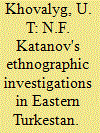

|
|
|
|
|
| Publication |
2013.
|
| Summary/Abstract |
By order of Russian Geographic Society and Russian Academy of Science, 'N. F. Katanov was preparing for the ethnographic and linguistic investigations in South Siberia, Kazakhstan and Eastern Turkestan. In December 1888 he visited a key region of the Yenisei, Uryankhai region for his research of the Tuvinians' (the Uryankhais and Soyons') language and culture, where he stayed till autumn of 1889. From there he went to the regions of rivers Agul, Biryusa and Uda to the Karagas people. There he had been working till April 1890. Later, the texts collected there were publishedl. From the Karagas people N. F. Katanov continued his travel to Semirechye, then in summer 1890 through Chuguchak to Urumchi, to the residency of a governor of Eastern Turkestan. He spent his winter and the beginning of 1891 in Tarbagatai, where having received emperor's letter from Beijing he started to travel around Gansu-Xinjiang again and got to Myao-orl-du (High monastery) which was situated a little bit more eastern from Komul. In March 1892 he hit the road from Komul to Turfan, from where he went through Urumchi, Gulja and through Semirechye again to Minusinsk from where he returned to Saint~Petersburg in December 1892. In Semirechye and Tarbagatai, Katanov researched the language and customs of the Kazakhs from kins kerei, argyn, naiman and Sarat citizens and in Chinese Turkestan he studied the language and traditions of the local Uygursz. In Germany there is some part of ethnographic and linguistic material which was collected by professor N. F. Katanov from the population of north-eastern part of Eastern Turkestan, whidi was famous in the written sources before as Uiguristan (country of the Uygurs).
|
|
|
|
|
|
|
|
|
|
|
|
|
|
|
|
| 11 |
ID:
128482
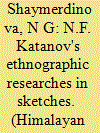

|
|
|
|
|
| Publication |
2013.
|
| Summary/Abstract |
Nickolay Fyodorovich Katanov is one of the outstanding scholar- Turcologists, a researcher of Ural-Altaic world. His creative work was devoted to multidimensional aspects of scientific activity: ethnography and history, linguistics and translation studies, literary studies and folklore, numismatics and museum work, archaeology and local lore. He was also a talented professor whose lectures drew numerous audience at Kazan University. In spite of the multidimensionality of N. F. Katanov's creative activity one of his main merits is the study and research of culture and ethnic world of the Turkic peoples in South Siberia, Eastern Turkestan and Central Asia. Katanov's collection during four years of his travels (1889-1892) of priceless material such as manuscripts and journal records testifies about it. Later these were published in Sketches of Uryzmkhai land.
|
|
|
|
|
|
|
|
|
|
|
|
|
|
|
|
| 12 |
ID:
128485
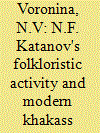

|
|
|
|
|
| Publication |
2013.
|
| Summary/Abstract |
N.F. Katanov's difficult, arduous folkloristic collection is of special value in literary studies and cognitive aspects in his extensive scienti?c, pedagogic, enlightening and social activity. Recorded and processed by an outstanding Khakass scholar, folklore texts are not only keepers and translators of the Turkic peoples' spiritual culture but they also accumulate creative work of Khakass poets and novelists. For example V. K. Tatarova (1952), a Khakass poet and novelist, distinguished public figure and famous theorist of Katanov studies wrote parables/ book of poems Cowberry on a palm in 1995 on the basis of materials of an ethnographic expedition around the Minusinsk depression carried out by N. F. Katanov in 1889-1892. It should be noted that "... in the sphere of the Turkic-speaking habitation of Siberia and Eastern Turkestan a researcher managed to collect a great linguistic, ethnographic and folklore material" which today is of
cognitive value as a collection of Turkic fairytales, fables, songs, proverbs and sayings. "Folklore materials were published in the IX volume of Folk literature samples of the Turkic tribes (St. Petersburgh, 1907) where folklore pieces of work of the Uryankhais (1,410 names), Khakasses (1,159 names), Karagases (203 names) were included"?
|
|
|
|
|
|
|
|
|
|
|
|
|
|
|
|
| 13 |
ID:
128453
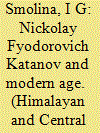

|
|
|
|
|
| Publication |
2013.
|
| Summary/Abstract |
The year 2012 marked the celebration of the 150th birth anniversary of outstanding Russian scholar, orientalist, turkologist, doctor of comparative philosophy Nickolay Fyodorovich Katanov. One may admit that in Khakassia during the recent 150 years a researcher of such high level as Nickolay Fyodorovich Katanov has not been born yet.
|
|
|
|
|
|
|
|
|
|
|
|
|
|
|
|
| 14 |
ID:
163143
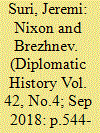

|
|
|
|
|
| Summary/Abstract |
Although besieged by public anger over a volatile economy and failed foreign wars, a rise in terrorism, and impeachment proceedings in Congress, President Richard Nixon visited the US Naval Academy in June 1974 and extolled detente with the Soviet Union. He defended his policies od cooperation with an aggressive Russian adversary.
|
|
|
|
|
|
|
|
|
|
|
|
|
|
|
|
| 15 |
ID:
163144
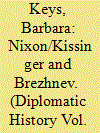

|
|
|
|
|
| Summary/Abstract |
In June 1973, Leonid Brezhnev arrived in Washington for his second summit meeting with President Richard Nixon. Knowing of the Soviet leader's fondness for luxury automobiles, Nixon gave him a shiny Lincoln Continental. Brezhnav was delighted with the present and insisted on taking a spin around Camp David, speeding through turns while the president nervously asked him to slow down.
|
|
|
|
|
|
|
|
|
|
|
|
|
|
|
|
| 16 |
ID:
128487
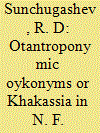

|
|
|
|
|
| Publication |
2013.
|
| Summary/Abstract |
In recent years in linguistics, investigation of proper names including anthroponymics and oykonymics has been developing extensively. Anthroponymics is a branch of onomastics, which studies anthroponyms
-personal names of people: proper names, patronymics (father's names or other names after father), surnames, tribal names, nicknames and pseudonyms (individual or group), cryptonyms (concealing names)';
oykonymics is a branch of toponymy, which studies oykonymsz, i.e. names of any settlements. These branches are still one of the poorly studied ?eld of Turkic onomastics. In Khakass toponymy considerable part of settlements' names belong to anthroponyms, i.e. proper names and surnames. Formed from anthroponyms, oykonyms give important information of linguistic, historical, ethnographical and ethnocultural nature. They point at the bygone settlement of peoples and tribes, reflect traditional folk culture
and change processes in the socio-political and economic life of people.
|
|
|
|
|
|
|
|
|
|
|
|
|
|
|
|
| 17 |
ID:
128483
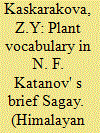

|
|
|
|
|
| Publication |
2013.
|
| Summary/Abstract |
Nickolay Fyodorovich Katanov was a great scholar, who gathered the richest material in ethnography, linguistics and folklore, providing a valuable source for studying different sides of the Turkic peoples' life, including Khakasses. Being a linguist- Turcologist N. F. Katanov started his scientific work with the study of the Khakass language, which he spoke, and relying on its knowledge, he began to research other related kind red languages. During his study in Krasnoyarsk high school, he went to various places every year, gathered folklore, linguistic texts and described the customs of the Sagay people. A researcher of the Tatar language D. G. Tumasheva notes: "Nicloloy Fyodorovich was not only an educated and intelligent man but he had his own material, which had been written by him from the first hand through direct contact with the people. N. F. Katanov laid emphasis on the latter, considering the necessity to study a language by means of direct interaction with the people and not by separating history of a language from ethnography, folklore and history of material culture."
|
|
|
|
|
|
|
|
|
|
|
|
|
|
|
|
| 18 |
ID:
110099
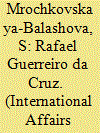

|
|
|
|
|
| Publication |
2011.
|
| Summary/Abstract |
OVER 100 YEARS AGO, the Russian Academy of Sciences received from Paris a vast archive of the Turgenev brothers (their letters, diaries and other documents) repatriated by son of Nikolai Turgenev. Alexander Fomin* who had done a lot to bring the precious documentary collection to Russia spent many years reading, studying and, bit by bit, publishing it. The students of Pushkin and his epoch were jubilant: the legends and stories which came down to them by word of mouth and tales yarned by the few who outlived the epoch of the great poet - in short, everything on which the Pushkin studies had been standing - could be confirmed (or disproved.) By that time, all contemporaries of the great poet had been dead - there was nobody to raise havoc, to object and to condemn the violators of ethics.
|
|
|
|
|
|
|
|
|
|
|
|
|
|
|
|
| 19 |
ID:
051358


|
|
|
|
|
| Edition |
2nd ed.
|
| Publication |
New Delhi, Asian educational services, 1996.
|
| Description |
xviii, 421p.: ill.hbk
|
| Contents |
Old Publication
|
| Standard Number |
8120611497
|
|
|
|
|
|
|
|
|
|
|
|
Copies: C:2/I:0,R:0,Q:0
Circulation
| Accession# | Call# | Current Location | Status | Policy | Location |
| 048076 | 958/MAR 048076 | Main | On Shelf | General | |
| 057996 | 958/MAR 057996 | Main | On Shelf | General | |
|
|
|
|
| 20 |
ID:
075926
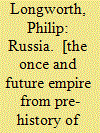

|
|
|
|
|
| Publication |
New York, St. Martin's press, 2005.
|
| Description |
vii, 398p.: ill., mapsHbk
|
| Standard Number |
9780312360412
|
|
|
|
|
|
|
|
|
|
|
|
Copies: C:1/I:0,R:0,Q:0
Circulation
| Accession# | Call# | Current Location | Status | Policy | Location |
| 052139 | 947/LON 052139 | Main | On Shelf | General | |
|
|
|
|
|
|
|
|
|